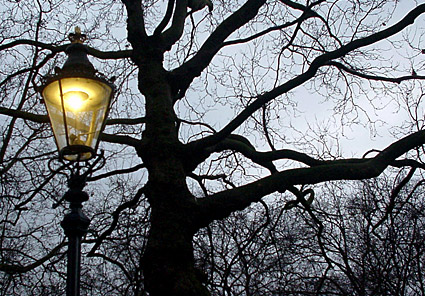The Lamps Are Going Out, But Where? December 3, 2012
Author: Beach Combing | in : Contemporary , trackbackLord Grey’s famous quotation that ‘the lamps are going out all over Europe’ came eventually to encapsulate the horror of 1914. Grey, then Britain foreign secretary and an exquisitely cultured and civilised individual, spoke the words on 3 August 1914 just before the great powers collectively committed suicide. He recorded the statement in his autobiography in 1925 and there is no reason to doubt that this comment was actually made. Apart from the fact that Grey was always honest we also have a witness, the British journalist Alfred Spender who admitted, in 1927, that the sentence was said in his presence:
I saw [Grey] again late in the evening at his room at the Foreign Office on Monday, August 3, and it was to me he used the words which he has repeated in his book [the 1925 autobiography], ‘The lamps are going out all over Europe, and we shall not see them lit again in our lifetime.’ We were standing together at the window looking out into the sunset across St. James’s Park, and the appearance of the first [gas] lights along the Mall suggested the thought.
The phrase seem to have caught on not in the 1920s but only in the 1930s and 1940s, which is surprising because by then the light has flickered on and off another time. However, Beach is troubled by something else and that is where the lamps were going out. He would instinctively interpret Grey’s phrase as meaning. ‘Christ, Spender, the bloody Continentals are about to destroy themselves through war.’ In other words the British were not to be involved in Armageddon.
This would be a characteristic British use of the word ‘European’ that takes for granted that the British are not part of the continent. For the 99% of humanity who have the good or bad fortune not to be born in the Green and Pleasant Land, this might seem a little eccentric: look at a globe. But it is deeply embedded in British skulls. For example, when Beach was writing ‘the bloody Continentals’ above, he automatically wrote ‘the bloody Europeans’ and then had to go back and ‘correct’ it for an international audience.
In the 1920s, Grey, of course, may have reinterpreted the sentence. By then it was fairly clear that Britain’s participation had been disastrous. (Arguably her non-participation would have been catastrophic, that though is another question.) But there are two things that give Beach courage in his interpretation. First, there is a long tradition of the British looking eastwards, shaking their head as events unfold ‘over there’ and just pulling up the drawbridge. The most famous of these is Pitt’s ‘Roll up that map: it will not be wanted these ten years’ after Austerlitz. Grey was, I suspect, speaking in that tradition.
Second, is the fact that Grey was inspired by seeing the gas lamps being lit in the London streets. Doesn’t that tell us about his state of mind? ‘The lights are coming on in dear old Blighty, where a cozy, safe evening is pressing in, but those poor buggers in France and Germany…’ Of course, Britain was going to fight: Grey was one of the reasons that Britain went in guns blazing. But 3 August 1914 there was still the idea that the UK would do most of its shooting from ships against a crappy [sic] German navy: the mass BEF of 1915 had not yet been imagined. So let’s restore this sentence to what it originally was. A melancholy cry at the misfortune of Britain’s neighbours, not a breast-beating woe-is-me. There would be plenty of time for that later… Other opinions: drbeachcombing AT yahoo DOT com
***
4 Dec 2012: From MR a comment that adds substantially to our knowledge: As Grey waited for the reply to the British Ultimatum (delivered by Goshen in Berlin at 7.00 pm), I was told that Grey was looking across the park toward 9 Carlton House Terrance ( the German Ambassador’s Residence at the time), actually NW if you look from the Foreign Secretary’s Office. There used to be a mantle gas lamp at the foot of the Duke of York’s steps, just below the rear of No 9, and I was told as a boy that this was the lamp stand in particular that inspired Grey’s remark’. Sunset in London on August 3rd occurs at 8.44 pm GMT. Assuming the lamplighters worked as they did when I was a boy the lamp would have been lit about 8.30 p,m., just before sunset. So Grey made the remark to Spender having not heard from Goshen. (Goshen’s telegram from Berlin to London, informing London that the ultimatum had been rejected immediately, was sent from Berlin but not delivered in London — suggesting interdiction of the cable traffic by Germany). Grey would therefore assume that he was at war with Germany, however that the participation of the UK would be limited to the naval commitment he had given to the French on August 2nd. As of August Britain had no extant plan for the embarkation of any force to France.’ Thanks MR!!!



